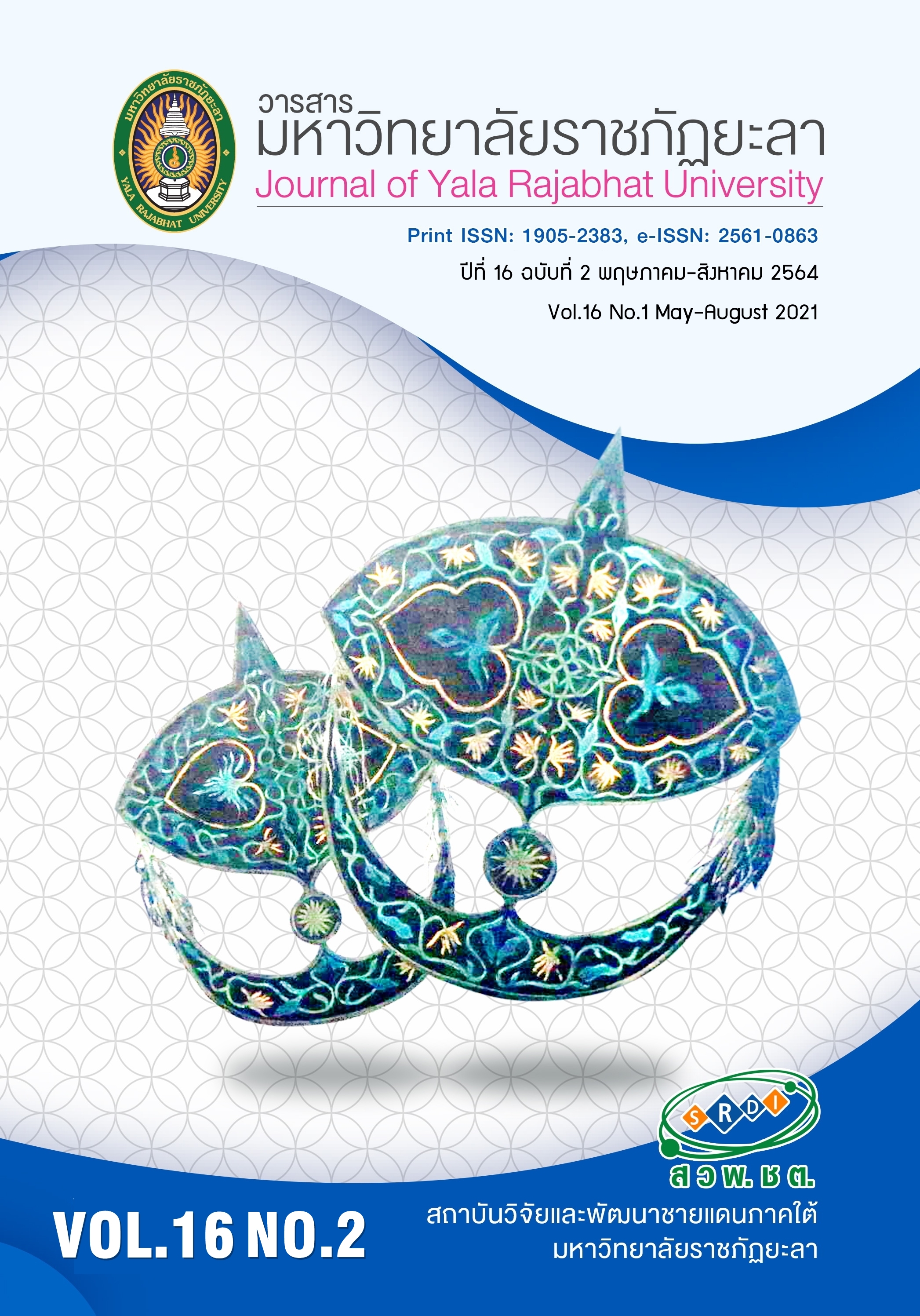ความต้องการจำเป็นในการพัฒนาสมรรถนะประจำสายงานของครู โรงเรียนเอกชนสอนศาสนาอิสลามในจังหวัดยะลา
Main Article Content
บทคัดย่อ
การพัฒนาสมรรถนะประจำสายงานของครูมีความจำเป็นต้องศึกษาสภาพที่คาดหวังกับสภาพที่เป็นจริงและเพื่อจัดลำดับความสำคัญของความต้องการจำเป็นด้านสมรรถนะประจำสายงานของครู โดยกลุ่มตัวอย่าง คือ ครูโรงเรียนเอกชนสอนศาสนาอิสลาม จังหวัดยะลา 271 คน สุ่มมาแบบหลายขั้นตอน โดยการสอบถามความต้องการจำเป็น วิเคราะห์ข้อมูลหาค่าเฉลี่ย ส่วนเบี่ยงเบนมาตรฐาน การทดสอบค่าที และค่าดัชนีการจัดลำดับความต้องการจำเป็น PNI modified พบว่า สภาพที่คาดหวังกับสภาพที่เป็นจริงด้านสมรรถนะประจำสายงานของครูโรงเรียนเอกชนสอนศาสนาอิสลาม จังหวัดยะลา แตกต่างกันอย่างมีนัยสำคัญทางสถิติที่ระดับ .01 กล่าวคือครูมีความต้องการพัฒนาสมรรถนะประจำสายงานในทุกด้าน โดยมีสภาพที่คาดหวังด้านการวิเคราะห์ สังเคราะห์ และการวิจัยเพื่อพัฒนาผู้เรียน ค่าเฉลี่ยมากที่สุด รองลงมา คือด้านการบริหารจัดการชั้นเรียน ส่วนสภาพที่เป็นจริงที่มีค่าเฉลี่ยน้อยที่สุด คือด้านการสร้างความสัมพันธ์และความร่วมมือกับชุมชน เพื่อการจัดการเรียนรู้ และการจัดลำดับความสำคัญของความต้องการจำเป็น พบว่า ด้านที่มีค่า PNI modified สูงสุด คือ ด้านการวิเคราะห์สังเคราะห์ และการวิจัยเพื่อพัฒนาผู้เรียน (PNI=0.23) รองลงมาคือ ด้านการสร้างความสัมพันธ์และความร่วมมือกับชุมชนเพื่อการจัดการเรียนรู้ (PNI=0.22) และด้านการบริหารจัดการชั้นเรียน (PNI=0.20) ตามลำดับ ดังนั้นผู้บริหารหรือผู้กำกับนโยบายควรจะกำหนดแนวทางการพัฒนาสมรรถนะประจำสายงานของครูถือว่าเป็นเครื่องมือที่สำคัญในการพัฒนาการศึกษาให้มีคุณภาพ
Article Details
บทความ ข้อมูล เนื้อหา รูปภาพ ฯลฯ ที่ได้รับการเผยแพร่ในวารสารมหาวิทยาลัยราชภัฏยะลานี้ ถือเป็นลิขสิทธิ์ของวารสารมหาวิทยาลัยราชภัฏยะลา หากบุคคลหรือหน่วยงานใดต้องการนำทั้งหมดหรือส่วนหนึ่งส่วนใดไปเผยแพร่ต่อหรือกระทำการใดๆ จะต้องได้รับอนุญาตเป็นลายลักษณ์อักษรจากวารสารมหาวิทยาลัยราชภัฏยะลาก่อนเท่านั้น
เอกสารอ้างอิง
Boonnak, K. & Jasuwan,S. (2020). Managerial factors affecting competency development of teachers in the 21st century in primary Islamic schools. SSRU Graduate Studies Journal, 13(1), 62-77. (in Thai)
Bunphirom, S. (2014). Classroom management. Bangkok: Triple. (in Thai)
Chuensuksomwng, N. & Jaruchainiwat, P. T. (2014). A needs assessment to develop early childhood teachers’ professional competency. An Online Journal of Education, 9(1), 713-727. (in Thai)
Deemae, A., Suwanno, P. & Bakoh, N. (2020). Factors affecting the competency of teachers in bilingual schools in the Three Southern Border Provinces. Journal of Yala Rajabhat University, 15(3), 383-391. (in Thai)
Etling, A.W. (2002). Needs assessment for extension agents and other nonformal educators. [Online]. Retrieved 17, 2020, from: https://eric.ed.gov/?id=ED388774
Evertson C.M. & Weinstein C. (2013). Classroom management in the field of inquiry. In Handbook of Class-room Management: Research, Practice, and Contemporary Issues. Edited by C.M. Evertson & C.S. Weinstein., pp.3-15. New Jersey: Routledge.
Forward section, Ministry of Education. (2017). Strategic education plan the special development zone of three southern border provinces 20 Years (2017-2036). Unknown Print Source. (in Thai)
Freiber, H.J. (1999). Beyond behaviorism: Changing the classroom paradigm. Boston: Allyn and Bacon.
Kaufman, R., Rojas, A.M., & Mayer, H. (1993). Needs assessment: Concepts and application. Englewood Cliffs, NJ: Educational Technology Publications.
Kessunk, P. Kumyon, A. Phutthasen, G. & Kessunk, O. (2019). Competency and need assessment for professional development in 21st century, Loei province of teachers in social studies, religion and culture learning substance. RMUTSV Research Journal, 11(1), 132-145. (in Thai)
Kounin, J. S. (1970). Discipline and group management in classrooms. New York: Holt, Rinehart, and Winston.
Laewongnin, K & Usaho, C. (2018). Approaches to the competency development of novice teachers under the Secondary Educational Service Area Office 2 according to the concept of school-based teacher development. Educational Management and Innovation Journal, 2(1), 1-19. (in Thai)
Maktappong, P. & Sumettikoon, P. (2018). Strategies to enhance functional competency of secondary school teachers under the secondary education service area office 9, Suhanburi Province., OJED an Online Journal of education, 9(3), 706-717. (in Thai)
Masae, K. (2013). Problems and guidelines for teacher’s development in Islamic private schools under the Office of Private Education, Pattani Province. Master’s Thesis. Islamic Educational Administration and Management, Prince of Songkhla University. (in Thai)
McClelland, D.C., (1975). A Competency model for human resource management specialists to be used in the delivery of the human resource management cycle. Boston: Mcber
McKillip, J. (1987). Need analysis: Tools for the human services and education. Newbury Park, Calif: Sage Publications.
National Education Act B.E.2542 (1999) and Amendments (Second National Education Act B.E. 2545 (2002). Bangkok: Office of the National Education Commission. (in Thai)
Office of the Basic Education Commission. (2010). A manual for teacher’s competency assessment (Revised Ed.). Unknown Print Source. (in Thai)
Phuangsomjit, C. (2017). Establishing school-community relationships. Veridian E-Journal, Silpakorn University, 10(2), 1342-1354. (in Thai)
Songmuang, J. & Kaenin, T. (2020). States, problems and needs of leachers in instruction in Islamic Private Schools. AL-NUR journal of graduate school, Yala Islamic university, 7(13), 19-32. (in Thai)
Wongwanich, S. (2019). Needs assessment research. Bangkok: Chulalongkorn University. (in Thai)
Wright, L. (2001). HR Competencies: Getting them right. Canadian HR Reporter, 14(19), 20.
Yejanih, A., Wongnam, P., Panhoon, S., & Anusasananan, S. (2015). Multi-level causal model of factors affecting lalamic private school effectiveness in the border provinces. AL-NUR journal of graduate school, Yala Islamic university, 10(18), 43-66. (in Thai)


